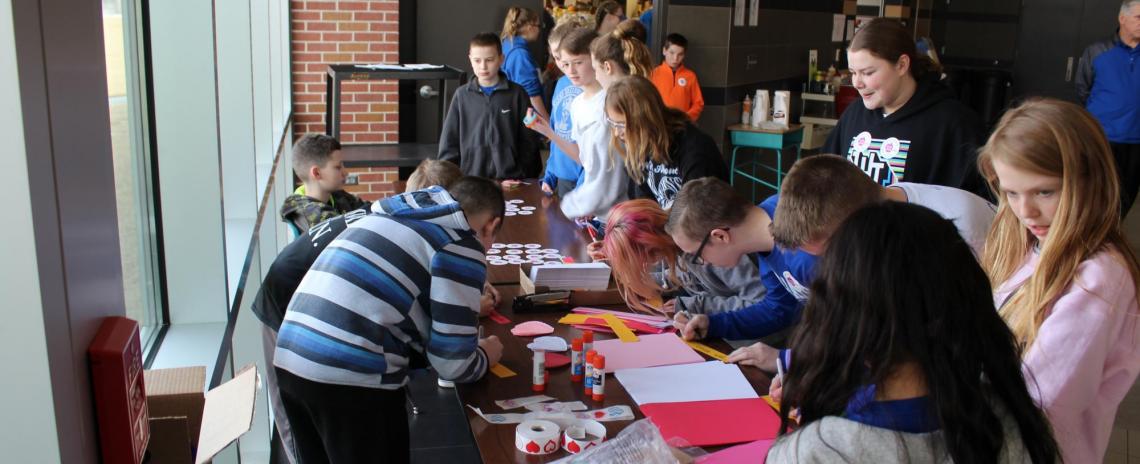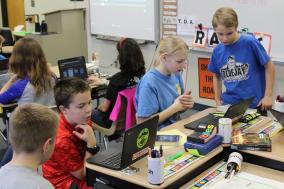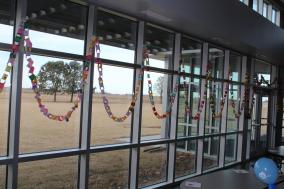Building a Bluejay: Ashland-Greenwood's culture shift opens doors to kindness
Building a Bluejay: Ashland-Greenwood's culture shift opens doors to kindness
By Tyler Dahlgren
NCSA Communications Specialist
School culture gone wrong is never an easy fix.
It’s hard to cultivate a uniform, school-wide front of positivity, mostly because one wouldn’t know where in the wide, wide world of education to start.
Four years ago, Brad Jacobsen stared at a list of names.
The sheet of paper contained 15-20 middle-schoolers and 20-30 high school students in jeopardy of failing three, four, or even five classes. His staff had worked on grading, teaching and learning practices, but the same students seemed to be falling in to the same pattern.
He was in his fourth year as principal and 17th altogether at Ashland-Greenwood, and he needed to know where to start.
“Let’s see if it’s a relationship thing, and make an intentional effort to build stronger relationships,” he said to a group that met monthly to discuss at-risk students. “We will make an intentional effort to reach out to certain kids that were struggling. What we saw in the group of 8-12 kids was that the ones we made the most contact with started to see their failing grades disappear.”
And so the revolution began.
***
Will Bergsten is a fourth-grade student at Ashland-Greenwood, and he’s proud of it.
It’s Friday morning, an easy time for an elementary student to lose focus, but that’s not the case in Patrick Mencke’s classroom, where Will and his classmates solve math problems interactively on their touch screen computers.
“Last year we had to do a lot of writing, so it was a lot harder,” Will said. “With computers, it’s a lot easier to learn. I just think it’s a fun thing to do and a good way to show what you did in class.”
Students are engaged and excited to show off their work in the class that focuses on BlendEd strategies. Programming enthusiasm for education can sometimes require innovation. The seed has to be planted early.
“We are very proactive at Ashland-Greenwood,” Mencke, in his third year of teaching at Ashland-Greenwood, said. “We are always looking to the future in what we can do that is best for our students.”
When Mencke came to Ashland-Greenwood, the administration’s message was loud and clear from the get-go.
“Build relationships,” he said. “We are all about building relationships with the students and the community and we believe that’s going to provide our students with the best education.”
Will lights up when asked about his teacher.
“He’s a great teacher,” the basketball player said. “He coaches high school basketball and goes to the games, so sometimes I meet him there and have conversations with him and he will always say ‘See you at school!’”
Kindergarten teacher Diane Starns wouldn’t expect her young students to come to school eager to learn if she wasn’t oozing excitement herself, so she makes sure that’s never the case.
“The kids are absolutely fabulous and they love coming to school every day, just as I love coming to school every day,” Starns said.
Starns has taught at other schools, but says the wonderful community and administration make Ashland feel like home. Teresa Luers, a fourth-grade teacher, echoes Starns’ sentiment.
“We have a great PTO,” said Luers, whose students had just finished their first presentation of the “ABC’s of Nebraska. “Anything we need, they provide. We have a really great situation, and everybody at the school works together so someone can be successful. It’s not like a competition. We all want everybody to succeed, and at the end of the day it’s about doing what is best for the kids.”
The culture shift at Ashland-Greenwood is first apparent in the classrooms at the elementary school, where students are instructed by energetic teachers responsible with building the first bridges into the education world.
Once a week, teachers receive an email from superintendent Jason Libal containing a challenge to do something with fellow staff or students that week. Each morning, Jenny Washburn and other second-grade teachers stand at the door and greet students as they enter the building.
“It’s all about making those strong connections and building relationships with the students,” Washburn, who is amazed by what her three children in the district have learned, said. “We are really talked to by the administration and it has just trickled down.”
Tyler Cogswell is in his first year at Ashland-Greenwood Elementary, and one of the first things that stood out to him about his new school was the passion of his peers. From day one, they’ve been open to the Special Education teacher’s suggestions, and have collectively put the kids first.
“Ashland is kind of like one big family, and I really mean it, everyone is almost related,” Cogswell jokes. “They really do treat you like family here. That’s been a really nice part of the adjustment and it’s really helped me find my way as a teacher.”
Cogswell has a brother with severe Cerebral Palsy, and says the quality of Nebraska’s special education programs played a large part in bringing him back to the state from where he student taught in Texas. Throughout his Skype interview with Ashland-Greenwood, it became increasingly apparent to Cogswell that Ashland-Greenwood was devoted to its own program. The fit was perfect.
“The students make coming to work each day worth it, definitely,” Cogswell said.
***
Across town, the lunch bell rings.
If you’ve got a tray, and if you’re a middle school or high school student, then you’ve got a place to sit.
Nobody Eats Alone Day marks the end of Kindness Week, a five-day push to spread positivity and good vibes. “Working for Kindness”, “Class Colors Day”, “Start a Chain Reaction Day” (where students hand out compliments on sheets of paper that are added to a chain display in the cafeteria), and “Red out for Little Giants" fill the first four days of the week.
Jacobsen said the idea stemmed from the school’s participation in “Rachel’s Challenge” three years ago. Rachel Joy Scott was the first person killed in the Columbine High School tragedy in 1999, but the impact her kindness had on fellow students is still felt today. The non-profit organization has a mission to start a chain reaction of kindness and compassion in schools.
“Their whole thing is about shining light on the positives, instead of cursing the darkness,” Jacobsen said. “Don’t spend your time looking at what has already happened or too late to fix. Let’s think about what we can do, not what we shouldn’t.”
Instead of finger-wagging and stuffing more rules into a book, Jacobsen and his committee of staff members took a proactive approach at shifting culture. The staff went through Marzano Training, where they learned the importance of student engagement. That triggered a reflection on consistency and intentional teaching.
How do you engage kids and motivate the unmotivated?
How do you continually teach and re-teach desired behaviors?
“Words impact relationships. Relationships impact culture. Culture impacts results,” Jacobsen said.
In February, it gets dark early. It’s cold and dreary outside. Around this time each year, teachers see a decline in their student’s grades, and that pattern became frustrating.
It was time to get proactive, and Kindness Week was born.
***
At Ashland-Greenwood, being mean is no longer cool, and the students make sure of it.
“We have made standing up for one another the norm,” said senior Elsie Burke, who tries to give three genuine compliments every day. “Students in our school have taken the initiative in making our school a safe and encouraging environment for all.”
Burke says her favorite part of being a student at Ashland-Greenwood is the relationships her teachers pursue and build with their students. The concerted effort is recognized and reciprocated.
“I believe every single teacher in our school knows me by name, and they know my activities, my personality and my hobbies,” Burke said. “The feeling of friendship that is established among staff and students builds a strong foundation for respect in and out of the classroom.”
From time to time, the train can drift off the tracks. There’s still adversity in Ashland-Greenwood, as there is in schools throughout the country. The difference now is that there is a culture in place to fall back on.
“If I were to see something that was not supportive to helping others, I would speak up and do something to get it fixed,” said junior Braden Kern. “Each day, I try and make someone’s day better. I’m always seeing stories of how one person’s actions, no matter how small they seem, do wonderful things.”
Braden, Elsie, and other Bluejays at Ashland-Greenwood aren’t trying to change the world. They’re just trying to say something nice. Maybe they’ll brighten a peer’s day. Maybe they’ll spark a chain reaction.
Yes, public schools face challenges.
But Jacobsen isn’t connecting a chain of challenges. They’re words of encouragement, from one student to another.
A chain of compliments hanging high above the Ashland-Greenwood cafeteria, signifying the power of positivity.
One by one it grows.
The beating heart of Ashland-Greenwood’s new culture.




